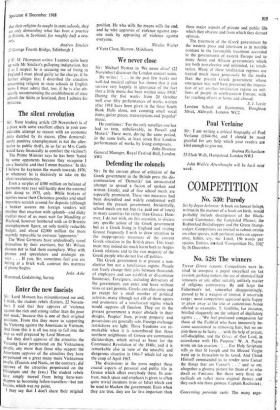Defending the colonels
Sir : In the current phase of criticism of the Greek government in the British press the dis- continuation of `Demotiki' (an unsuccessful attempt to spread a fusion of spoken and written Greek), and of free school meals are especially prominent. These two measures had been discredited and widely condemned well before the present government. Incidentally, school meals are not free (i.e. paid out of taxes) in many countries far richer than Greece. How- ever, I do not wish, on this occasion, to discuss any specific action of the Greek government but as a Greek living in England and visiting Greece frequently I wish to draw attention to the inappropriate treatment of the current Greek situation in the British press. This treat- ment may indeed do much harm both to Anglo- Greek relations and to the vast majority of the Greek people who do not live off politics.
The Greek government is at present a non- elective but not a totalitarian regime. People can freely change their jobs between thousands of employers and can establish or discontinue businesses. Foreigners, including detractors of the government, can enter and leave without visas or exit permits. Greeks can also come and go except for a small number of political activists, many (though not all) of them agents and promoters of a totalitarian regime which would suppress all freedom. They see in the present government a major obstacle to their designs. Peoples' lives, private property and possessions are generally safe. Foreign exchange restrictions are light. These freedoms are re- markable when it is remembered that three northern neighbours of Greece are communist dictatorships, which served as bases for the Communist Revolution of the 1940s; and it is remarkable also in view of the unstable and dangerous situation in 1966-7 which led up to the coup of April 1967.
The discussions in the press neglect these crucial aspects of personal and public life in Greece which affect everybody there. In con- trast, much space and emphasis is given to often quite trivial incidents (true or false) which can be used to blacken the government. Even when they are true, they are far less important than these major aspects of private and public life which they obscure and from which they detract opinion.
The treatment of the Greek government by the western press and television is in notable contrast to the favourable treatment accorded to the governments of eastern Europe and to many Asian and African governments which are both non-elective and unlimited, i.e. totali- tarian. Many of these totalitarian regimes are treated much more generously by the media than the present Greek government whose emergence may well have prevented the imposi- tion of yet another totalitarian regime on mil- lions of people in south-eastern Europe, with far reaching effects at home and abroad.
S. J. Louis London School of Economics, Houghton Street, Aldwych, London WC2


































 Previous page
Previous page